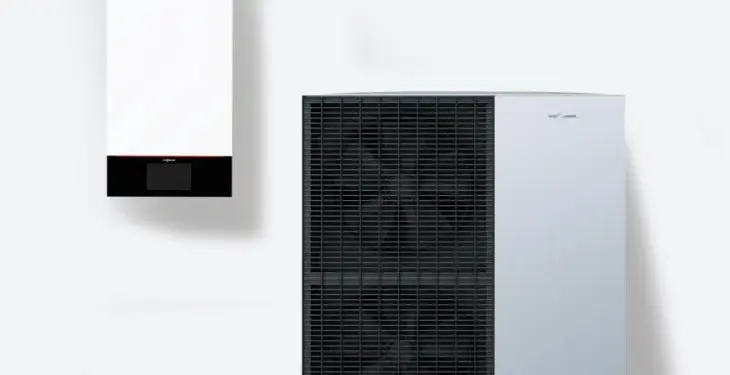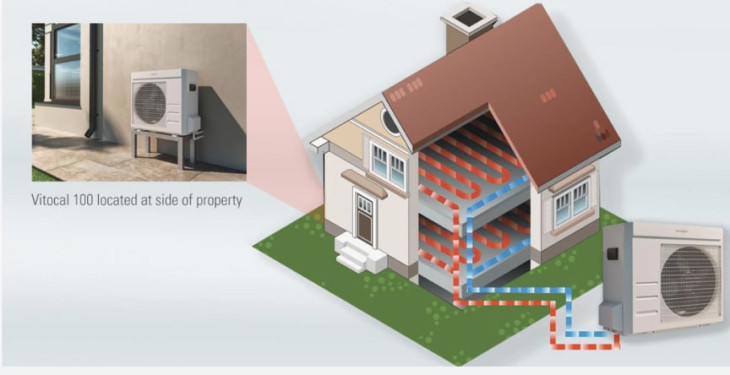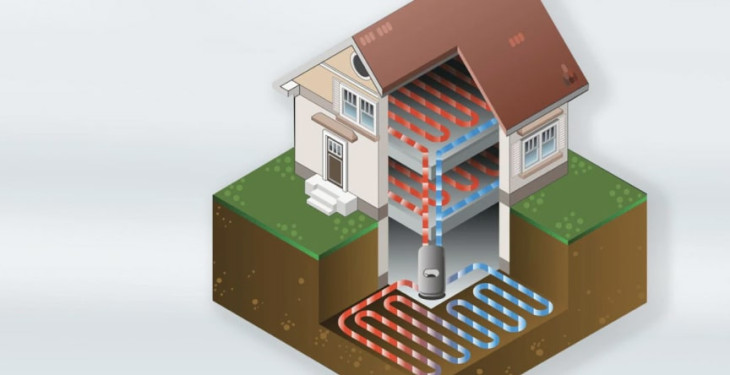

Written by Stephen Day
Gas Safe Engineer
Updated: 6th February, 2026
As energy efficiency and environmental concerns continue to shape our choices, heat pumps have emerged as a popular option for heating and cooling homes.
Get a new boiler quote, save up to £550 per year (0% APR available).
A heat pump is an energy-efficient system that moves heat from the outside air, ground, or water into your home. Using refrigerants and compressors, heat pumps absorb heat even from cold air, compress it to raise the temperature, and transfer it indoors to heat your space or water.
The refrigerant circulates in a loop, absorbing and releasing heat to provide consistent, renewable heating for your home.
Heat pumps are well-suited for energy-conscious homes as they reduce reliance on fossil fuels and lower carbon emissions.
The installation of heat pumps is typically more expensive than traditional heating options, but they offer high energy efficiency and long-term cost savings. For optimal results, heat pumps work best in well-insulated homes.
Heat pumps are incredibly energy-efficient, especially in moderate climates or well-insulated homes. For every unit of electricity consumed, they can produce multiple units of heat, making them more efficient than traditional heating methods.
This efficiency can lead to considerable savings on your energy bills, potentially covering the initial higher costs over time. With a heat pump, you’re also lowering your carbon footprint, as they use renewable energy sources and produce fewer emissions.
Eco-Friendly Heating: By using renewable energy sources, heat pumps reduce household carbon emissions and support sustainable living.
Year-Round Comfort: Heat pumps offer both heating and cooling, making them versatile for all seasons.
Durable System: Properly maintained heat pumps can last 15-20 years, providing reliable service for a long period.
Boosts Property Value: Homes with energy-efficient systems like heat pumps are often more appealing in today’s eco-conscious market.

These extract heat from the air and are available in two main types:
This type heats the air indoors through a fan system and is suitable for homes with ductwork.
This system transfers heat to water-based systems, such as radiators or underfloor heating, making it ideal for homes without ductwork.

By extracting heat from the ground through buried pipes, ground-source heat pumps offer a stable source of heat due to the consistent temperature underground. Although installation costs are higher, they provide dependable energy savings, making them a worthwhile investment for certain properties.
While heat pumps offer efficient, renewable heating, there are still scenarios where a gas boiler might be more practical, particularly in many UK homes:
Cold Climates: In extremely cold weather, heat pumps can struggle to reach high temperatures, whereas gas boilers provide strong heating even in freezing conditions.
Existing Gas Infrastructure: If you already have a well-functioning gas system, installing a new boiler can be a straightforward and cost-effective solution.
Lower Initial Investment: Gas boilers generally come with a lower upfront cost than heat pumps, making them an appealing option for budget-conscious households.
The UK Government’s Boiler Upgrade Scheme incentivises the switch to eco-friendly heating systems by offering financial support to eligible homeowners. Through this scheme, homeowners can receive grants to cover part of the installation costs for heat pumps and other renewable heating systems.
Air-Source Heat Pump Grant: £5,000 off installation costs
Ground-Source Heat Pump Grant: £6,000 off installation costs
Biomass Boiler Grant: £5,000 off installation costs
Despite an initial underperformance, the scheme continues with £300 million allocated over two years to help more homeowners make the switch to heat pumps and reduce their carbon footprint.
Heat Pump Pros | Modern Gas Boiler Pros |
|
|
|
|
|
|
|
|
|
|
Heat Pump Cons | Gas Boiler Cons |
|
|
|
|
|
|
|
Boilers can be a daunting purchase for many people as they’re an appliance with a lot of responsibility, providing heat for you and your family is something you want to get right. Boilers aren’t exactly a quickly disposable item either, potentially lasting you a decade.
Boiler costs can be split into two segments: the first is the actual boiler itself (unit price), and the second is the cost of the boiler being installed (set up) in your property by an expert engineer.
Here at iHeat, we want to remove all of this undue stress and make the decision making process of upgrading to a new central heating system, as easy as possible.
Installation Type | Price (inc VAT) | |
Combi to combi swap | £1,845 | |
System to combi conversion | £2,499 | |
New boiler install | £2,899 | |
Back boiler to a combi | £3,299 | |
System to system | £1,945 |
Some location factors that can influence the price of your new boiler
You will be given a specific quote from the boiler installation company based on:
The type of home you have (i.e. terraced, semi-detached, etc.)
How many bedrooms you have
How many bathrooms you have
Your postcode and specific location
The Alpha E-Tec Hybrid heat pump is a heating solution that its manufacturers claim to be both a gateway into renewable heating, while never compromising on the reliability provided from a traditional gas boiler.
This boiler is a highly efficient and modern combi and can run off traditional mains gas or LPG (ideal for off-grid properties).
Alpha have designed this boiler to be installed without the requirement of an airing cupboard for housing, making this type of install extremely simple for a Gas Safe registered engineer.
An Alpha E-Tec Hybrid can be fully synchronised with modern and convenient smart tech controls, allowing for instant and efficient temperature regulation.
A small temperature control dial is included with the installation, simple to use and portable to a bedside table, kitchen side top or coffee table next to a sofa, meaning you can warm up your home from wherever you like.
The E-Tec boiler uses a feature called ‘outdoor temperature and demand’ to monitor and adjust flow temperature. Sensors on the outdoor heat pump will detect low temperatures and switch your heating on to combat the cold, including radiators in any room you require!
The heat pump will switch on at a certain temperature removing unnecessary strain from your boiler, a highly cost effective route as energy and gas tariffs are analysed in order to ascertain the most efficient and financially responsible way to heat your home.
Your current energy consumption data is put into the Alpha software and smartphone app to produce the best possible heating strategy for you, and any time your needs or bills change you can filter in new data to re-calibrate your plan.
Alpha studied annual energy usage and have determined 60% of the year the heat pump will be the most financially viable heating option, allowing for huge potential savings on your gas bill as heat pumps run on electricity.
Despite recent misconceptions that there is a looming ‘ban’ on gas boilers, this is actually incorrect!
It’s still completely legal to buy and install a new gas boiler in any type of property, the supposed ‘ban’ only applies to new build properties after 2026.
There is no current financial penalty to keeping an existing gas boiler in any type of property past 2026, or installing a new gas boiler in any pre existing property past 2026.
New gas boilers blend efficiency, safety, cost effectiveness and versatility, hence their constantly rising popularity.
Get a quote in 60 seconds, fitted as fast as next day!
0% APR finance available.
Last updated: 6th February, 2026

Written by Stephen Day
Gas Safe Engineer at iHeat
Stephen Day is a Gas Safe registered and FGAS certified engineer with over 20 years of hands-on experience in the heating, cooling, and renewable energy industry, specialising in boiler installations, air conditioning, and heat pump systems.
LinkedInArticles by Stephen Day are reviewed by iHeat’s technical team to ensure accuracy and reliability.

13th February, 2026
Boiler energy efficiency refers to how well a boiler uses its fuel to generate heat. This...
 Read Article
Read Article

12th February, 2026
This Valentine’s Day we want to let you in on a dirty little secret…
 Read Article
Read Article

12th February, 2026
In this guide, we’ll be answering some of the most frequently asked questions about what h...
 Read Article
Read Article
No obligation. Takes less than 60 seconds.